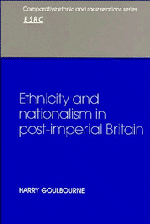Book contents
- Frontmatter
- Contents
- List of figures
- Acknowledgements
- 1 Introduction
- 2 The general problem
- 3 The communal option
- 4 Traditional and ethnic nationalism
- 5 From imperial British to national British
- 6 Diasporic politics: Sikhs and the demand for Khalistan
- 7 Diasporic politics: the demand for democracy in Guyana
- 8 Nationalism and the new pluralism in Britain
- 9 Conclusion: the need for a new national consciousness
- Notes
- Bibliography
- Index
9 - Conclusion: the need for a new national consciousness
Published online by Cambridge University Press: 05 January 2012
- Frontmatter
- Contents
- List of figures
- Acknowledgements
- 1 Introduction
- 2 The general problem
- 3 The communal option
- 4 Traditional and ethnic nationalism
- 5 From imperial British to national British
- 6 Diasporic politics: Sikhs and the demand for Khalistan
- 7 Diasporic politics: the demand for democracy in Guyana
- 8 Nationalism and the new pluralism in Britain
- 9 Conclusion: the need for a new national consciousness
- Notes
- Bibliography
- Index
Summary
In these concluding remarks I want briefly to consider some of the main dangers of this phenomenon, which I have called the communal response, to the challenge of community in post-imperial Britain. This communal response, moreover, is not contradictory to the position of either the exclusivism of the cultural-conservative persuasion nor to the patronizing liberal establishment, which upholds a dubious, because muddled, sense of justice through pluralism. Many groups and individuals, who see themselves as being committed to a progressive agenda, also support the communal response to the challenge of a national community. The first group pays too much attention to a narrow nationalism whilst the second often tries to avoid the question of nationalism altogether but, implicitly, supports or gives credence to the communal option through its own endorsement of the new pluralism. It is pertinent, therefore, to organize these final comments around the dangers these responses present as obstacles to the emergence of a fair and just national British community.
The new pluralism and post-imperial Britain
One fascinating fact about the communal option in Britain is that it has an appeal for the exclusivist conservative-culturalists as well as for the new pluralists. At least, the communal option does not contradict the views of either the new pluralists or the little Englanders. Whilst the intentions, hopes and arguments of those who hold these positions differ significantly, their visions of post-imperial Britain tends to converge on the same point – the suggestion that Britain is best served by adopting the communal mode of development.
- Type
- Chapter
- Information
- Ethnicity and Nationalism in Post-Imperial Britain , pp. 234 - 242Publisher: Cambridge University PressPrint publication year: 1991
- 1
- Cited by



